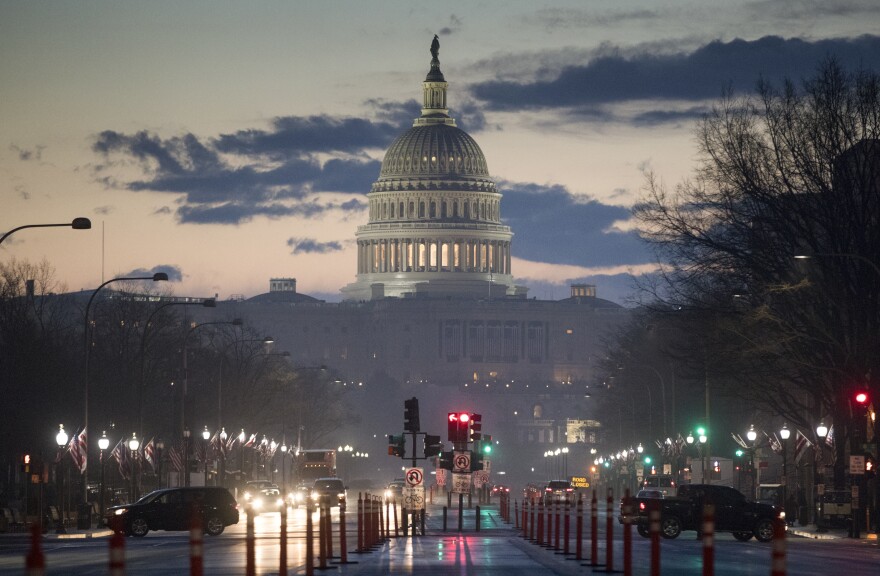A look back at inauguration speeches, the cross section of race, gender, class, sexuality and culture, warping reality and the term 'gaslighting' in modern culture.
‘My fellow citizens’: the inaugural address through the ages
Tomorrow, Donald Trump will be sworn in as the 45th president of the United States. Following the oath of office, the president will give his inaugural address as every president has done since George Washington.
This first speech given in office is seen as a hallmark of an incoming administration and is an implied part of the pomp and circumstance of the day. The funny thing is, there's nothing in writing that says a president has to do it at all.
With that in mind, we wanted to know, how did the inaugural address evolve into such an important moment? So, for some inaugural address history, Take Two's Libby Denkmann spoke with Eric Rauchway. He's an author and history professor at UC Davis.
George Washington and the first inaugural address
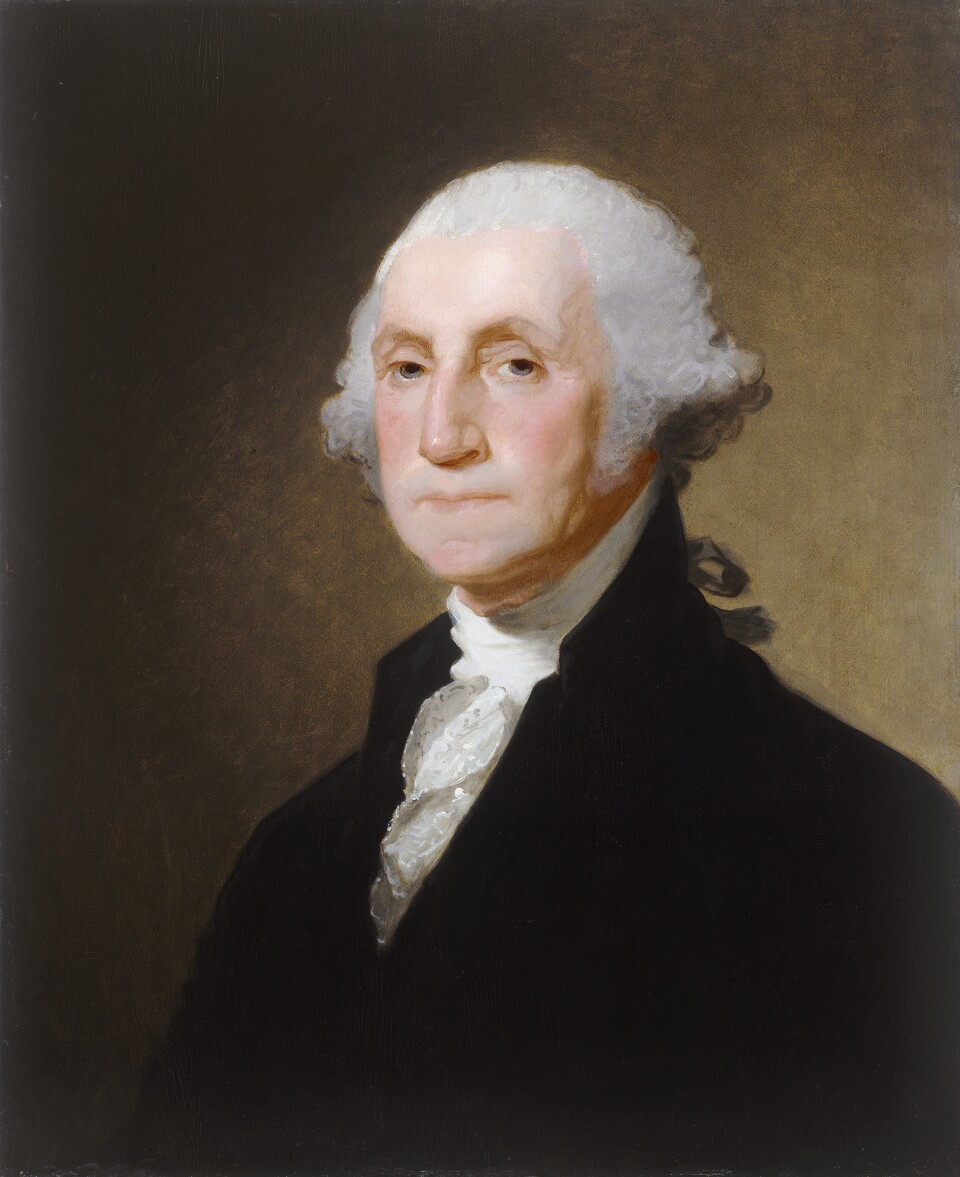
Washington started it when he first came into office. He knew that his principle job as president was going to be deciding what the job of president was together with Congress. So, he wanted to reassure people that he was going to give due deference to congress as well as exercise his authority to the best of his ability. That was the purpose of his original inaugural and presidents have since followed suit.
Thomas Jefferson: a call for unity (1801)
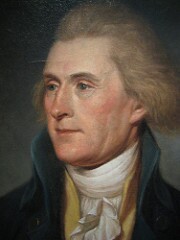
"We have called by different names brethren of the same principle. We are all Republicans, we are all Federalists"
Jefferson came to power after the 1800 election which was a tied election in the Electoral College. It had to go to the House of Representatives for resolution and it took them 35 ballots to finally decide that Jefferson should be president. So, it was a bitterly fought election, very close, and one that resulted in a transfer of power from Jefferson's political opponent, John Adams and the Federalist party to Jefferson, leader of the Democratic Republican party. So, Jefferson really wanted— after that struggle and after that rather unpleasant campaign which included a lot of slurs— so reassure people that he was going to be, as we would say now, president of all Americans.
Franklin Delano Roosevelt: in the face of fascism (1933)
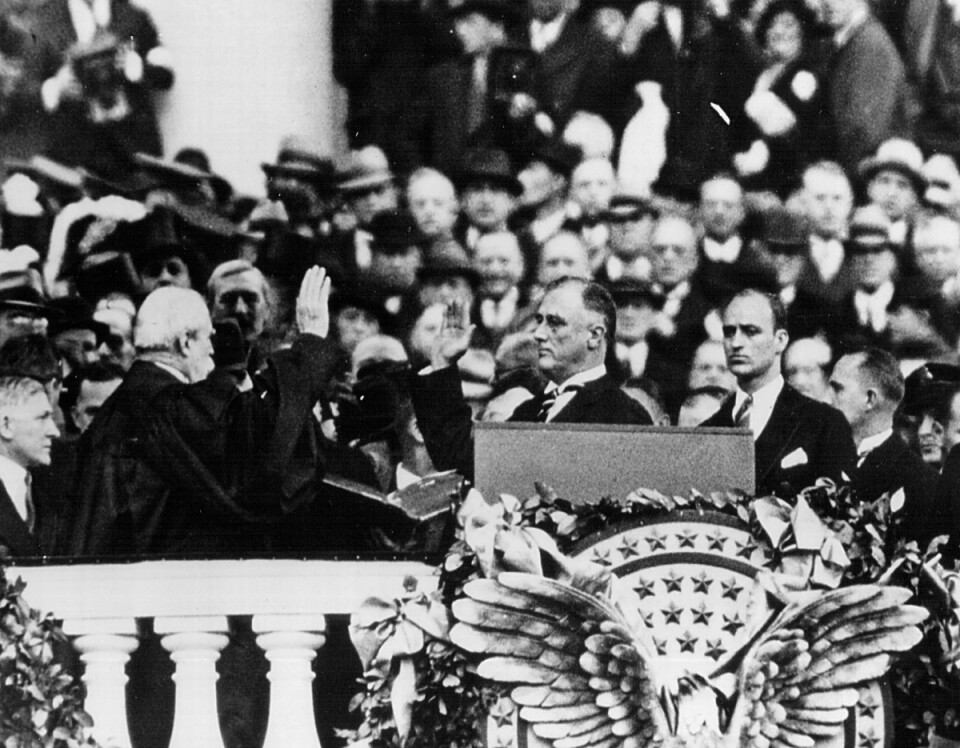
"Let me assert my firm belief that the only thing we have to fear is fear itself"
This was after the last long period between election and inauguration. It used to be that presidents were inaugurated in March. So, Roosevelt was elected in November of '32 and didn't take office until March of '33 at which time The Depression got even worse and banks had begun to fail. In fact, by the time Roosevelt took office, banks were shuttered around much of the country, there was a run on the dollar in the international markets. And meanwhile, you have this 4-year crisis where there's about 25% unemployment in the United States as indeed in much of the world. That crisis had led to Adolf Hitler coming to power in Germany at roughly the same time. So Roosevelt recognized there was a tremendous political crisis at home and abroad. And a crisis in the faith that people had in their ability to govern themselves. So he was addressing that by saying, that the only thing we have to fear is... the fear that makes us act in an unreasoning fashion...."
John F. Kennedy: legendary orator (1961)
"And so my fellow Americans, ask not what your country can do for you, ask what you can do for your country"
It's a beautifully written speech and Kennedy was a great speaker. Those two things together have made Kennedy's relatively few addresses often quite memorable. He was there calling Americans to action. He was the president to speak to and to speak for the large generation of youths which we've come to know as the baby boomers who felt rather inspired by this young president who has succeeded the older Eisenhower. And so he was calling folks to action. He was calling the world to action. He went on to say, ‘ask not what American will do for you, but what together, we can do for the freedom of Man.’ And announcing in very well written and almost poetic phrases, a new mission for the United States.
Ronald Reagan: a departure from the past (1981)

"In this present crisis, government is not the solution to our problem. Government is the problem"
Reagan sort of did a U-turn against the tendencies of The New Deal, and Kennedy's New Frontier, and Johnson's Great Society. He began to suggest that we shouldn't expect to be able to use public resources to further our welfare. But rather that we should return to using private energies as had been the case before The Great Depression to a larger extent.
The influence of media on the presidency
Once you begin getting film, especially film together with sound early in the 20th century, the president becomes more important as an individual. Before that, he's basically a party leader and people vote for the party. Usually, the parties would distribute ballots and they would already by pre-filled-out... and folks would just cast that ballot. But once you begin getting into an era of more mass enfranchisement and an era where you can actually see or hear the president speak, it becomes a question of judging the character or the personality of someone that will be very soon coming into your movie theater, coming over your wireless set, or by television, coming into your living room.
Looking towards Donald Trump's inauguration
It's hard to say. So many things about this president-elect and his campaign have been unexpected... and so, I suppose we should expect more of the same. His camp has let out that apparently he's written the speech himself and hopes to do it in the Jacksonian mold— certainly invoking Andrew Jackson. It's hard to know quite what that would entail.... So, I guess we will just have to see.
Quotes edited for clarity
Catch NPR's special coverage of the presidential inauguration tomorrow live on 89.3 KPCC.
To hear the interview, click on the Blue Media Player above
Will Donald J Trump also be the 'gaslighter-in-chief'?
It's pretty safe to say that the relationship between the White House Press Corps and Donald Trump is getting off to a pretty tense start.
https://www.youtube.com/watch?v=Vqpzk-qGxMU
At least part of the tension comes from the view that the incoming President is, well, not always constrained by facts.
"Donald has a tenuous relationship with the truth."
-Ted Cruz, 2016
Cruz isn't the only one who's pointed out that Trump's relationship with the truth sometimes puts him at odds with those keeping track of the things he says.
Like that time when — to everyone watching — he appeared to mock disabled reporter Serge Kovaleski:
... but then subsequently denied it.
This constant tension led one writer to dub Trump the "gaslighter-in-chief." That led us to wonder: What is a gaslighter? And where did the term come from?
Well, it turns out it came from right here in Hollywood.
The idea of gaslighting went mainstream after a movie called "Gaslight" was released in the 1940s starring Ingrid Bergman. In it, her husband convinces her that she's going crazy by steadily dimming the lights in the house but insists they haven't changed.
https://www.youtube.com/watch?v=0ToLfQU2xmg&t=2s
So how does one deal with a gaslighter? How do you know you're being gaslighted? And how do you stop it?
For answers, Take Two spoke to Ramani Durvasula. She's a licensed clinical psychologist and author of the book "Should I Stay or Should I Go: Surviving A Relationship With a Narcissist."
Defining a gaslighter
"Gaslighting is a form of manipulation. And it's manipulation by lying to someone, denying you said something with the goal of making that person so weakened, that they start doubting their own reality," Durvasula says. "It really is the ultimate sort-of relationship terrorism."
Durvasula says gaslighting is a gateway habit: Those who lie might eventually use other means to exert power over a partner. She says it's one of the most common characteristics of relationships where abuse takes place.
"One of the worst things that you can do to a person is to deny their reality," Durvasula says.
Liars don't become liars overnight. Clinical psychologist Durvasula says the dishonest behavior is often present from the start of a relationship:
"It's simply who they are," Durvasula says. "They deny, and they twist the truth, and that's how they've always gotten through life."
Durvasula's take is simple: Liars always lie.
Spotting a gaslighter
Gaslighters often target vulnerable people. Durvasula compares it to finding the one gazelle in the herd with a broken leg. And she says these master manipulators often share one common trait.
"For a person who's a gaslighter, more often than not they're a narcissist. And the narcissist simply wants to get their way. It's always about the win for them," Durvasula says. "They're often thinking, 'How can I get to the win quickly?"
Press the blue play button above to find out how to deal with a gaslighter.
Understanding intersectionality and its role in social issues
This weekend, thousands of people are expected to go to the nation's capitol and participate in the Women's March on Washington.
Sister marches are happening all over the country, including one here in L.A. Organizers of the event have made it a point to emphasize, "women have intersecting identities and are therefore impacted by a multitude of social justice and human rights issues.”
But the phrase 'intersecting identities' or 'intersectionality' has some would-be attendants feeling confused, uneasy— and even excluded.
For more, Libby Denkmann spoke with Ange-Marie Hancock Alfaro. She's the author of "Intersectionality: An Intellectual History."
Interview highlights
What is intersectionality or intersectional feminism?
"Think of how you live your life. None of us live our lives as...only women on Monday, Wednesday, Friday or we're only gay on Tuesday, Thursday, Saturday. We live our lives, as our entire lives. Every single day of the week, right? What we've traditionally done when we think about something like feminism or when we think about even how social sciences have approached these kinds of questions is to really think about these things being separate, conceptually you can separate out. This is the gender part of me and this is the race part of me, and this is the class part of me.
We live it all at the same time, so that's really the core of what intersectionality is all about. Instead of trying to break everything down into its simplest, lowest common denominator...instead thinking about that complexity matters and needs to stay part of the conversation."
Why is it important to have and understand this extra concept?
"The concept actually emerged out of activists and scholars' engagement with the civil rights movement and with the women's movement...
Part of why intersectionality is so important is because when the women's movement wanted to say, 'but we just want to focus on what we have in common and we're worried that this will divide us.' What ends up happening is it doesn't just divide in the way that they fear, it actually ends up mistreating or treating women differently based on their race and so it really becomes a significant problem...certain communities don't trust the police for very logical and rational reasons in terms of the ways in which their communities have been policed and so they don't want to contribute to incarceration problems and they know about criminal justice reform.
Other communities, because of language barriers, or cultural differences actually have different ways of resolving domestic violence. So for example, there are folks who are immigrants from India, folks who are immigrants from China who bring different cultural approaches to actually resolving domestic violence. So, they're no less committed to resolving domestic violence, it's clear to say, but they want to be able to do it in a culturally appropriate way and that was what was not able to happen when you don't have a conversation that's taking place in an intersectional way.
Does this risk alienating and making white women feel like they can't speak up anymore?
"One of the things that intersectionality really does, when it's done right...it allows people to actually understand and process those feelings of feeling either shut down or excluded. Because when one has been in a position of power for a long time, even if one does not recognize oneself as being in a position of power, what is actual equality can actually feel like oppression.
The march is designed to be a launch of a greater conversation rather than the stopping point of a conversation. So, I think the first thing I would say is remember that. To those women who were feeling shut down. This is the start of the conversation, not the end of the conversation.
The second thing is that intersectionality has been demonstrated to actually build stronger and more enduring cross-racial coalitions but it does require the investment of time, energy and attention. So it is going to be difficult to do in just a chat room, or just on a comment section of a blog or in a one day march. It really is an ongoing process and a life commitment."
To hear the full conversation, click the blue play button above.
Dear President Obama: SoCal residents reflect
In just under 24 hours, the Obama presidency as we know it will come to an end.
For many, it's hard to remember where we were in life eight years ago.
But for others, the election of the nation's first black president marked a turning point — maybe a change of perspective, or even a change in purpose.
That's true for Stephanie Hammerwold of Aliso Viejo.
KPCC asked listeners to share their parting words to President Obama. Stephanie recorded hers and sent us this.
Below is a transcript of Stephanie's letter. You can hear her reading it by clicking the blue play button above.
Dear President Obama,
Several years ago, I made the decision to leave behind corporate life to start small human resources consulting business. This led me down a path where I'm starting a non-profit to help formerly incarcerated women find meaningful employment.
Knowing that I would no longer need to rely on an employer for health insurance — that I could get coverage through Covered California and the ACA — helped me make the decision to do this.
When I made the decision to start my non-profit a year ago, because of your recognition of the issues affecting the formerly incarcerated, I knew that we were living in a time when our leaders support the type of work we're doing. This has inspired me to get back to my non-profit roots and to shift my provisional focus back towards helping other people.
Last week, you asked us to believe in our ability to bring about change, and I take that to heart every day when I sit down to design our programs for job-seekers and figure out how to reach out to employers to get them on board with recognizing the value of supporting the formerly incarcerated.
You and Michelle have served as exemplary role models, and your leadership continues to inspire me to be in service to others and help raise up other Americans.
Thank you.
Sincerely,
Stephanie Hammerwold
Stephanie was one of more than two-dozen listeners who responded to KPCC's online questionnaire. Others just wrote their thoughts.
Listener Gia Scott-Heron said:
My Grandmother loves him like a family member. She has pictures of him all over the house! In 2006, my Mom said that not only did she not believe that there would be a black president in her lifetime, but that there wouldn't be one elected in my lifetime either. I disagreed, and in 2008 I was elated to point out that my Mom was wrong!
Others were more critical of the Obama Presidency.
Raul Marquez writes:
My life before Obama was pretty normal. I had health insurance, and I got along with everyone. Now he has forced "Alinsky tactics" onto America. So much hatred and division! And my health insurance was canceled.
The Ride: Automakers announce flurry of investments ahead of Trump inauguration
Even before he steps into the Oval Office, Donald Trump has already shaken up the auto industry.
Trump's threats to go after car makers who build cars in Mexico and import them to the U.S. seems to be having some effect. And his threats to scrap or renegotiate NAFTA could be financially painful, auto execs say.
Meanwhile, over the past week, each of the Big Three automakers have made announcements of new investments in US plants. Ford, GM and Fiat-Chysler all say they will either build new plants or expand U.S. production in the coming years. And foreign makers from Hyundai to BMW also say they will ramp up production in the States.
Still, there seems to be agreement among automakers that if the Trump administration pulls out of the NAFTA trade agreement, it will hit them in their bottom line. And new research says it may hit Americans in their pocketbooks, too. The Center for Automotive Research says car prices would spike and the loss of the trade agreement, combined with tariffs, could eliminate more than 30,000 manufacturing jobs.
Motor critic Sue Carpenter tackles these topics, and looks at how changes at the EPA may also affect the auto industry. Click the blue bar above to listen to our conversation with her.
Attending state schools can improve economic futures of students
A new study from the Equality of Opportunity Project explores the economic futures of students, both low and high-income, and how the school that they attend impacts them.
According to Jon Friedman, a professor at Brown University and one of the study's authors, both low and high-income students who attend top-tier universities are likely to move up economically. However, far fewer low-income students are admitted to those universities than higher-income students.
The good news for those who find themselves with the option of attending a state school is that the experiences there can sometimes be as effective when it comes to helping people move up the economic ladder.
"An important finding from our study is that while a fraction of students enrolled, kids are most likely to move up at the very very top schools," Jon Friedman said. "In fact, most of the kids that move from the bottom of the income distribution to the top, don’t go to ivy league schools. In fact, there are more students who make that move at Cal State L.A. than I think at the entire Ivy League. Simply because Cal State L.A. enrolls so many more kids from low income families."
Friedman did say that mid and lower-tier schools have become less accessible to low-income students over time.
"Whether it’s because of budget cuts, or because of changing admissions policies, or changing tuition, I think that that’s a concerning trend if we think that access to these potential engines of mobility has been falling over time," he said.
UCLA, Cal State L.A. and other Southern California schools have seen some of the highest levels of mobility from low to high-income amongst students that attend them.
To hear the entire conversation with Friedman click on the audio embedded at the top of this post.
State of Affairs: Inauguration, CA's budget error, and how CA views Trump
On this week's State of Affairs, who is and isn't going to the inauguration, what one lawmaker calls "the first California casualty of the Trump presidency," and the $1.5 billion accounting error in the California state budget.
Scott Shafer, KQED's Senior Editor for Politics and Government, and Jack Pitney, Roy P. Crocker Professor of American Politics at Claremont McKenna College, joined Take Two for our weekly look at government and politics in the Golden State.
Nick Offerman on woodworking, integrity and the little known story of McDonald's
Now, to some history of a little fast food joint you may have been to: McDonald's.
Presently, it's a global powerhouse —but it goes back to 1940 with just one restaurant, started by two brothers - Dick and Mac McDonald.
It began as a barbeque spot in San Bernardino complete with car hops taking orders.
But a few years later it started to look more like the Mickey D's we know today. Serving up cheap burgers and soft drinks like Henry Ford churned out cars: fast.
That drive for efficiency led the brothers to a milkshake mixer salesman whose name might sound familiar: Ray Kroc.
The new film "The Founder" tells that story of how Kroc (played by Michael Keaton) bought in to the business and built up the McDonald's franchise. However, the principles Kroc ran the restaurant on were ones that the McDonald's brothers deeply disagreed with.
Actor Nick Offerman, who you may know as Ron Swanson on the hit show "Parks and Recreation", plays Dick McDonald.
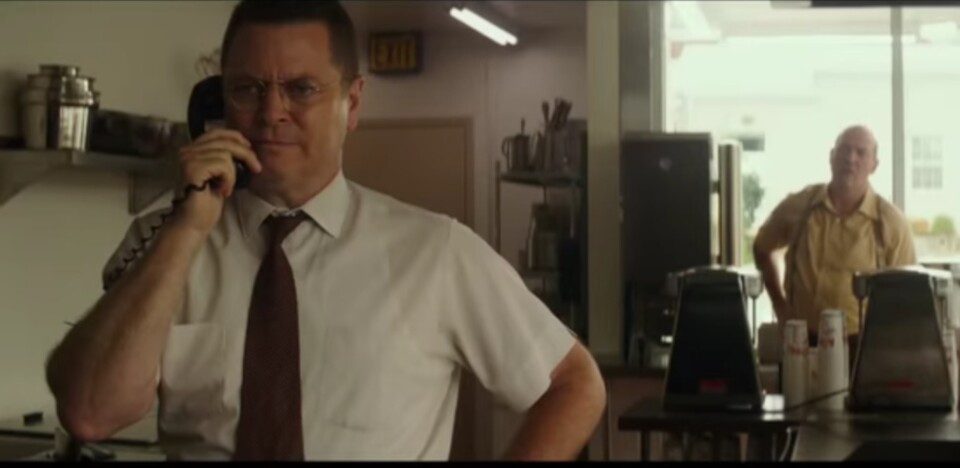
Take Two's Alex Cohen recently caught up with him to talk about his role in the film, his passion for woodworking and the timeliness of the movie in today's American culture.
Interview Highlights
Who was Dick McDonald and what was the struggle he eventually faces in building this business?
"It's depicted in the film on a phone call between Ray Kroc and Dick, where Ray Kroc– thanks to Joan Smith who became his second wife Joan Kroc– she discovered this powdered milkshake that would...would save them tons of expense on refrigerating the ice cream they used for their milkshakes.
Somebody says, 'Hey, if we lower the quality, if we lower the integrity of our ingredients, we'll make a lot more money,' basically. And he said, 'I'm not even going to consider that. If we can't sell products that have the full integrity of what we want to feed our children, then I don't want to sell anything.' And ultimately, that was part of what led to their downfall."
You're a woodworking guy, how did you get into that and what is the appeal? Why woodworking?
"It happened organically. I come by it honest. I grew up in a family of people who make things, farmers and school teachers and nurses...so all these family members taught me to use tools growing up. And so when I began looking for jobs, first to make money to pay for college and buy a car, I found out I could work in the theater scene shop for the college and that they would pay me wages and then that was when my love affair with the wood shop began.
It's so satisfying as a complement to show business because in the shop there's nobody giving me notes and I don't depend on any editor or director or studio. It's me and my stack of oak and at the end of the day I can tangibly feel the work I've done, instead of have to wait around for an audiences response and that is really satisfying. It's really meditative for me especially when I'm dealing with the frustrations of show business."
It feels like there's a certain timeliness to this movie even though it's a story that happened decades ago.
"When we shot the film it was just when this presidential campaign was getting started and I can't believe how appropriate this message seems.
...that was exactly John Lee Hancock's hope, was that the audience would leave and half of them would think Ray Kroc was a hero and half would think he was a villain. I think the truth is and the fascinating thing is, we all have some Ray Kroc and some Dick and Mac McDonald in us. And it begs the question, how much is your integrity worth? Or how much money can you make versus when is it okay to crush other human beings, your collaborators or business partners?
I feel like the American dream has sort of been tarnished in a way, it's become this notion of not having to back up your work with quality or integrity, instead you're selling people on a catchphrase or name on a building."



